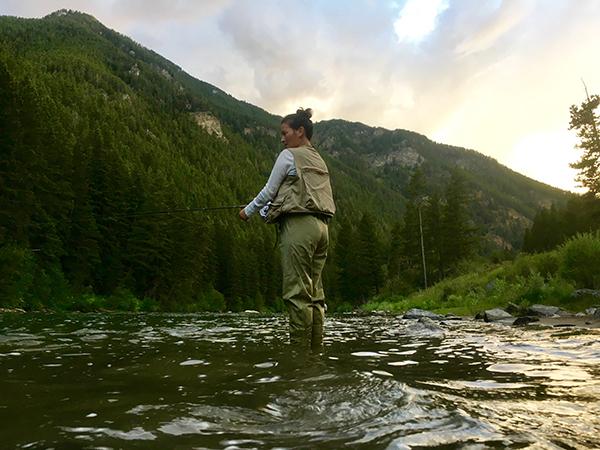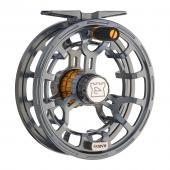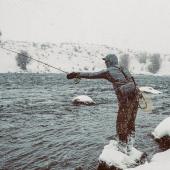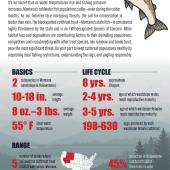A Fly Fisherman's Infatuation
I am not a fly fisherman. Lacking a true affinity for political correctness, I am not a fly fisherwoman either. But I do like to fly-fish. It is therapy and yet it is madness, like an addiction.
The lure of the river runs through all the seasons. Winter does most to suspend the sport, but as spring thaws nature's throat, the river calls the angler until there is no option but to return to her. These bodies of water, even more than the fish within them, provoke my admiration.
The river, ever mysterious, is alive: teasing, haunting, beckoning. She is a coy lady who lures her suitors, but like Mona Lisa, keeps her secrets. The fly fisherman, relentless suitor that he is, courts her. He never tires of playing games with her nor does she with him. But what is it that keeps him coming back? What charms hold his devotion? Not just beauty. No, something more, for a beautiful woman may be nothing more than nice to look at. Beauty can only captivate for so long. After all, wasn’t the ever-intriguing Cleopatra homely?
Women can be drawn to the river, too; maybe not in the same way men are, but drawn nonetheless. Perhaps women are merely invited, as a sort of courtesy, but rarely so intimately as the river calls a man. I am called to the river, half for the sake of fly-fishing and half for discovering her secrets, learning her ways. Yes, all women have a little something to learn from their competitors: how to get his attention and just what keeps him hooked.
The river has some kind of gravitational pull on a man, especially the fly fisherman. For one, the element of mystery keeps an angler interested. Like any genuine woman, the river keeps him guessing: "Where are your treasures, lady?" and "What little secrets will you spill today?"
I didn't always see it this way. I used to look at fly fishermen and ask myself, "Why would they willfully stand out in icy, rushing water with a pole and line in hand, waving and twisting around for hours? Where is the sport, the entertainment in that?" I didn't realize that fish were actually caught. Then I tried fly-fishing, and after a few minutes I asked myself, "Why am I willfully standing out in icy, rushing water with a pole – excuse me, rod – and line in hand, waving and twisting around for hours? And the torture, the aggravation of tangles, snags, puncture wounds, drowning, the pity of wet clothes and stiff hands, all to catch a lousy fish?" But that was before I had my first bite, before realizing that fish really did fall for such a routine, and before discovering that I had to refrain from swearing very loudly if I wanted to keep them in the vicinity.
Can a fish talk? I don't know, but he can communicate a whole lot to you when he's on the end of your line. First, he tells you that he approves of your fly, that it is possibly the most authentic–looking Royal Coachman he has ever seen. Then, in a jerk or two, he may tell you that your fly is not the least bit palatable and that he regrets having been so greedy. He may further convey how angry and suddenly frightened he is at having taste-tested this entree. He tells you, of course, over the wire. If ever there was a good application for the phrase "talking wire," is it to the line a fish is on.
Granted, fish are not one of the more mentally gifted of God's creatures; but I wondered just who was more ridiculous – the fish, mistaking a Royal Coachman for a feather-adorned fuzz of food; or the person who actually believed the fish would mistake the fuzz for food, able to recognize the specie (altogether foreign in the world of entomologists) for the remarkable representation it is. Royal Coachman? I was assured that the "fly" was originally a joke gone enterprise when the first of many anglers was captivated by its likeness to that insect which neither he nor a fish had ever seen. But that was before I learned to cast.
I am convinced that fly-fishing is popular not so much for its sport but rather for its art. Casting has everything to do with an individual's sense of self-expression and rhythm. One must set the rod to music. No, not to the headphones of a CD player, but to the river's own symphony. Perhaps this connection is what communing with nature is all about. The rush of water over and around the rocks provides a soothing accompaniment. The sudden splash of a fish rising is a cymbal's clash, rushing the heart, just as any master composition does. Reading this music is the key that unlocks just some of the river's mystery. But this insight came only after I had learned about the waltz.
It was in struggling with the casting technique, untangling the fly from my hair, that I first envisioned the waltz. In time to the river's orchestra, I allowed the rod and line to dance, "back, two three...forth, two three," until a beautiful courtship was born between rod and line as I learned to coordinate their movements in three-fourths time.
Like I said, I'm not a fly fisherman, I’m more of a dancer, really; but it was in this way that I grasped the essence of the cast – perhaps not expertly, but creatively anyhow. It was the first time I had really felt the rod in my hands. No more was it a foreign apparatus, a utility. Rather, it was a baton conducting an opus. And harmony begot function. Perhaps it was then that I came to know the river as a woman, and I understood the complex association man and river entertained. But it wasn't until I caught my first fish that I beheld the fruit of this relationship.
The fruit, mind you, is not so easy to pluck. A battle ensues between man and fish and I can't think for a moment that the fish is the doomed one. Our brains and brawn have no relevance when, at any moment, the little bugger will break loose from the bonds of a bad dinner choice and be lost for good.
From that moment on, you can bet he is preaching to others about his near-death experience and advising them to avoid at all costs the fatal fly. I can almost hear him warning his comrades, "Yeah, ya know the one that looks like a Royal Coachman." They all nod their heads despite the current, "Oh, yeah, that'll getcha every time." But there's always one who has to buck fate and better sense, in which case the angler engages no greater thrill as his quarry flails and flips over his domain.
In the hands of my memory, I hold this kind of fish...he gasps desperately, eyeing a strange dimension. He really is the biggest, most awe-inspiring fish I have ever seen. By goodness, he's breathtaking, displaying his brilliant, satiny attire, flecked with black diamonds and streaked with pastels. Except for his gasping, he lies motionless as the hook is released. While I stare in admiration, he suddenly slaps my hand and bails into his river, whose waters whisk him off, like a Don Juan into the night. A flood of my uncharitable farewells stream after him.
An unlikely catch and release this is. The river has once again proven her womanly qualities, presenting her harms, then snatching them away. Today, I have almost had enough of her.
Perhaps for many, the relationship is different. Maybe the male angler is more willing to make up with the river. Despite all the tricks she pulls, her charades and endless sabotage, the man forgets more readily his grudges and remembers her for the river she is, in all her mystery, with all her coyness and all her pleasantries. I can almost see her batting her eyelashes. I suppose I'm jealous. After all, there seems to be an understanding between a man and a river that I can't fathom. She can speak more to him in silence than I can in a thousand words.
Still, there is also an agreement between her and me and perhaps for many women who find the river their competitor. First, you can't compete with her. Nor can you beat her. And you can't join her either. She's like a sister: not so benign that she can be completely trusted, and not so threatening that she can't be loved.











